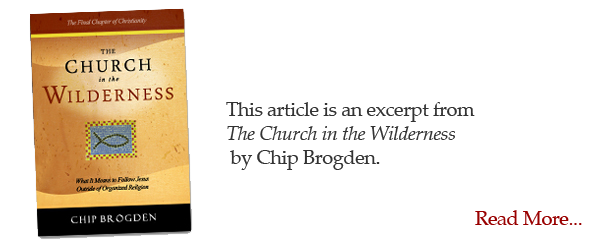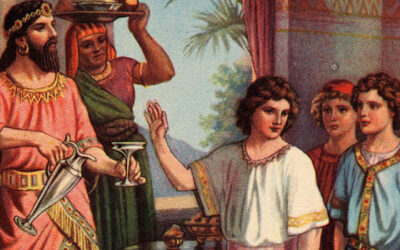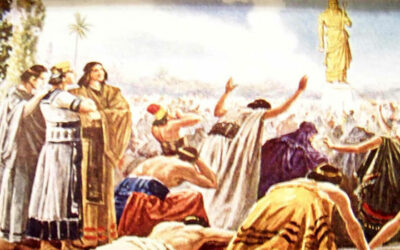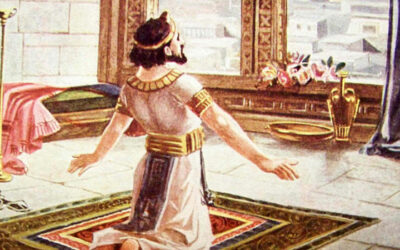This happened twice in the history of Israel, and it has happened twice in the history of Christianity. By looking back on how God has called His people out in times past, we can better see and appreciate the significance of the final exodus that is taking place at this time.
Israel’s First Exodus: God Called the Hebrews Out of Egypt
We have already seen that Moses established a “church in the wilderness” by leading the Hebrews out of Egypt and into the Promised Land by way of the desert of Sinai. This exodus is recorded in our Bibles, not just for its historical significance, but for us to learn by: “With most of them God was not pleased, for they were overthrown in the wilderness. Now these things took place as examples for us…” (1 Cor. 10:5,6). We see how they were tested in the wilderness, and how they failed many of the tests, and failed to enter into the Promised Land because of doubt and fear. We also see how many of them were tempted to go back to Egypt.
All these things are recorded so that we will recognize this tendency in ourselves today and not make the same mistakes they made. So this first exodus establishes the spiritual principle of God calling His people out and is the key that unlocks our understanding of how God goes about the difficult work of calling and setting apart a chosen people for Himself.
Israel’s Second Exodus: God Called the Jews Out of Babylon
Once the nation of Israel was established in the Promised Land, they began a slow and steady moral and spiritual decline, occasionally punctuated with godly kings and periods of repentance and revival. But eventually the wickedness of the nation called for judgment, and this judgment came in the form of Nebuchadnezzar, who conquered Jerusalem, destroyed the Temple, killed most of the people, and took the remainder as captives with him to Babylon, where they lived in exile for 70 years.
After that, the Lord once again called them to come out – to leave Babylon, journey back through the wilderness to Jerusalem, and rebuild their Temple and their city. The significant thing about this is that most of the Jews stayed in Babylon. Out of an estimated Jewish population of greater than one million people living in exile, only 42,000 returned. The vast majority preferred the comfortable bondage of Babylon to the uncomfortable, uncertain future of rebuilding their nation. The significance of this is extraordinary. Just as the young nation wanted to return to Egypt, the nation in exile wanted to remain in Babylon.
So we have two exoduses in the history of Israel that provide us with spiritual discernment into what follows after. Let us now turn to the two exoduses in the history of the Ekklesia.
Our First Exodus: God Called the Christians Out of Judaism
A remnant of Jews did return from Babylon. They rebuilt the Temple and inhabited Jerusalem once again. Having paid the terrible price of their idolatry, they resolved to never disobey God again. But in their zeal they went to the opposite extreme of fanaticism. What eventually developed was a religious system and a hypocritical priesthood obsessed with outward appearances and obedience to the letter of the Law while overlooking mercy, grace, righteousness, faith, and love.
Into this atmosphere our Savior was sent, just as Moses was sent to Pharaoh with a mandate to bring God’s people out of bondage and into the Promised Land. And, just as Pharaoh resisted Moses, so the religious leaders resisted Jesus. Undaunted, Jesus promised another “church in the wilderness” that would stand forever, and charged His disciples to take this message to “all nations” and “to the uttermost parts of the earth.”
Even with this clear direction, it would take many years for the truth to sink in: faith in Christ was not compatible with Judaism. Peter struggled with preaching Christ to the Gentiles and was rebuked publicly by Paul. James, based in Jerusalem, tried in vain to make Christianity fit in better with Jewish ideology. But once the Gospel was preached to the Gentiles, it marked the beginning of something new. The Way, as it was then called, was no longer a mere sect within Judaism. The Gentiles heard the message, and thanks to Paul, understood that faith in Christ has nothing to do with obeying the Law of Moses.
Now followers of Jesus were forced to make a decision. Were they going to “come out of Judaism” and be “a chosen generation, a royal priesthood, a holy nation, a set-apart people” distinct from Judaism, or, would they cling to their Jewish traditions and the teachings of their elders, all of whom rejected Jesus as the Messiah?
The letter to the Hebrews was written to Jews struggling with that very dilemma. After demonstrating conclusively that you cannot enjoy the benefits of the New Covenant while clinging to elements of the Old Covenant, the author concludes:
“We have an altar from which those who serve the tent have no right to eat. For the bodies of those animals, whose blood is brought into the holy places by the high priest as a sacrifice for sin, are burned outside the camp. So Jesus also suffered outside the gate in order to sanctify the people through His own blood. Therefore let us go to Him outside the camp and bear the reproach He endured” (Heb. 13:10-13).
Once again, when offered a choice between comfortable bondage and uncomfortable freedom, we find many chose to stay “within the camp.” They were known as the Ebionites – Jews who accepted Jesus as the Messiah but insisted on obedience to the Jewish laws and customs in order to be saved. Of course, they also rejected Paul as a genuine apostle. This group flourished within Jerusalem until it was destroyed by Titus in A.D. 70., after which they established themselves in Pella. They persisted for some time, but by the fourth or fifth century they were no longer in existence.
Our Second Exodus: God Calls the Remnant Out of “Churchianity”
By that time, the followers of Jesus were recognized as something springing out of, but totally different from, Judaism. For about 300 years the followers of Jesus practiced their faith in simplicity and in obedience to the teaching of the Holy Spirit, even when enduring fierce persecution from the Romans and the Jews. Eventually, Rome accepted Christianity and made it their state religion. Masses of “converts” poured in. Pagan temples were converted into “Christian” churches, and more church buildings were constructed. An elaborate hierarchy of bishops was established and a religious system was organized that soon exceeded the Jewish religion, both in numbers of adherents and in material wealth. Christianity became institutionalized into three main sects: Catholicism, Orthodox, and Protestantism. Out of Protestantism, Christianity was further splintered into thousands of denominations.
So we see that Israel’s history has repeated itself in the history of Christianity. Just as God called the Hebrews out of Egypt to form a new nation, so God called the early Christians out of Judaism to form a “new nation” of kings and priests. When Israel rebelled against God and committed idolatry, they were led away to Babylon for judgment. In like manner, when Christendom rebelled against God and created an idolatrous system of worship “in Jesus’ name,” they were also brought to judgment; the chief difference being that God did not send them away – He simply gave them over to their own devices, and they were quite content to proceed under the assumption that God was endorsing and blessing the works of their hands.
This brings us to the present time. Just as God called out a remnant of Jews to leave Babylon and journey to Jerusalem to rebuild the Temple, God has in these last days called out a remnant of Christians to leave “Churchianity” and take a journey through the wilderness. What is He bringing them to? Not to a temple made with hands, but to a house of living stones. Not to the Jerusalem that is below, but to the Jerusalem that is above: the New Jerusalem, the Heavenly City, whose builder and maker is God. It is a “Church in the Wilderness” – not a building, but a body of people in transition between the religious system and the spiritual fulfillment of God’s original intention for the Ekklesia.













